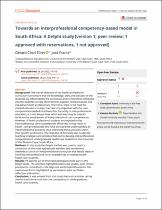| dc.contributor.author | Filies, Gérard Charl | |
| dc.contributor.author | Frantz, José | |
| dc.date.accessioned | 2023-05-18T07:50:44Z | |
| dc.date.available | 2023-05-18T07:50:44Z | |
| dc.date.issued | 2022 | |
| dc.identifier.citation | Filies GC and Frantz J. Towards an interprofessional competency-based model in South Africa: A Delphi study [version 1; peer review: 1 approved with reservations, 1 not approved]. F1000Research 2022, 11:116 (https://doi.org/10.12688/f1000research.74674.1) | en_US |
| dc.identifier.uri | https://doi.org/10.12688/f1000research.74674.1 | |
| dc.identifier.uri | http://hdl.handle.net/10566/8920 | |
| dc.description.abstract | Background: The overall objective of any health professional curriculum is to ensure that the knowledge, skills and attitudes of the students are influenced by the curriculum and to instil these attributes into the students, to help them become capable, compassionate and inquisitive health professionals. Therefore, there is the need for medical educators to align their learning objectives with the core competencies needed to achieve this. Currently, in interprofessional education, it is not always clear which activities may be used to facilitate the development of interprofessional core competencies. However, if health professional students are exposed to the interprofessional core competencies effectively, it may result in health care professionals who have an improved understanding of interprofessional practices, thus improving these practices within their specific professions. The objective of this study was to identify teaching strategies and activities that aim to develop interprofessional competencies in undergraduate health care students at the University of the Western Cape, South Africa. Methods: In this study the Delphi method was used to reach a consensus on the most appropriate activities and assessment methods to use in an interprofessional curriculum that would assist in instilling interprofessional core competencies in undergraduate health care students. Results: 19 experts out of 69 invited participants took part in this Delphi study. The activities highlighted were case studies, joint clinical placements, simulations, role plays and workshops/discussions. The assessment forms highlighted by participants were portfolios, reflection and rubrics. Conclusion: It was evident from this study that such activities can be used to instil more than one core competency in undergraduate health care students. | en_US |
| dc.language.iso | en | en_US |
| dc.publisher | PubMed | en_US |
| dc.subject | Curriculum mapping | en_US |
| dc.subject | Curriculum transformation | en_US |
| dc.subject | Graduate attributes | en_US |
| dc.subject | Interprofessional core competencies | en_US |
| dc.subject | Interprofessional education | en_US |
| dc.title | Towards an interprofessional competency-based model in South Africa: A Delphi study | en_US |
| dc.type | Article | en_US |

